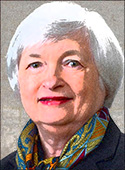By Pam Martens and Russ Martens: May 11, 2022 ~
As a result of the Dodd-Frank financial reform legislation of 2010, the U.S. Treasury Secretary chairs a key group of banking and Wall Street regulators called the Financial Stability Oversight Council – pronounced F-SOC for short. The idea behind F-SOC was that Wall Street’s insane binges into things like toxic subprime debt and credit default swaps would never again be allowed to sneak up on snoozing government watchdogs, take down the U.S. economy and put the Wall Street megabanks on a long-term feeding tube from the Fed as occurred from 2008 to 2010.
Yesterday, the Senate Banking Committee held a hearing to take testimony from Treasury Secretary Janet Yellen on F-SOC’s annual report to Congress and what F-SOC sees as the biggest threats right now to financial stability.
There were numerous fireworks during the hearing, including when Senator Tim Scott, a Black Republican Senator from South Carolina, grilled Yellen on her abortion position, asking: “Did you say that ending the life of a child is good for the labor force participation rate.” Yellen calmy responded with this:
“Roe v. Wade and access to reproductive health care, including abortion, helped lead to increased labor force participation. It enabled many women to finish school. That increased their earning potential. It allowed women to plan and balance their families and careers.”
Yellen added that research indicates that “denying women access to abortion increased their odds of living in poverty or need for public assistance.”
Another notable moment in the hearing came when Senator Catherine Cortez Masto, a Democrat from Nevada, posed her question to Yellen as follows:
“Last week Fabio Panetta, one of the European Central Bank’s six Executive Board Members, noted that the crypto currency market is now larger than the subprime mortgage market which triggered the global financial crisis. Nobody knows that better than us in the state of Nevada.
“And he says this $1.3 trillion [crypto] market shows strikingly similar dynamics. There are about 10,000 crypto assets now. So my question Madam Secretary is: one financial risk posed by the crypto currency is the concentration of ownership. Do you see any financial risk because professional investors and high net worth individuals hold almost two-thirds of the Bitcoin supply?”
Yellen said there could be financial stability risks if those professional investors were leveraged to the point “that a decline in the value of the assets could trigger financial distress which spills over to others.” Yellen said that President Biden has asked the U.S. Treasury and F-SOC to look at the risks presented by crypto and they will be issuing a “comprehensive report” on this shortly.
Yellen also said that the President’s Working Group has already issued a report on stablecoins which indicated that there could be a risk of a run on stablecoins which could threaten financial stability.
That run is clearly already happening. This morning, CNBC reported this:
“UST, a so-called stablecoin that’s meant to maintain a 1:1 peg with the U.S. dollar, plunged to as low as 31 cents Wednesday. It was last trading at less than 50 cents, according to CoinGecko data.”
As we reported yesterday, as of Monday’s closing price of $30,930, Bitcoin futures have plunged 55 percent from their high of $69,355 last November.
And that $1.4 trillion market cap for crypto that European Central Banker Fabio Panetta spoke about last week was a $2.9 trillion market cap last November, and a $2.2 trillion market cap as recently as April 2. It’s melting as fast as a snow cone in July.
The most amazing aspect of this hearing is that the one word that encapsulates the greatest and most imminent threat to the stability of the United States’ financial system was not uttered once from the mouth of any Senator from either party. That word is derivatives. Yellen used the word just once and then only in relation to the transition away from the interest rate benchmark Libor.
What was not questioned at all by Senators on the Banking Committee that oversees the Wall Street megabanks was the $234 trillion in notional (face amount) derivatives sitting on the books of these megabanks that are being called out every quarter in the Office of the Comptroller of the Currency’s Report on Bank Trading and Derivative Activities. Table 14 of this report (see page 19) indicates that just five bank holding companies are responsible for $200.18 trillion of that exposure or 86 percent of the total. Those mega bank holding companies are: JPMorgan Chase, Citigroup, Goldman Sachs, Morgan Stanley and Bank of America. Each of these banks required bailouts during and after the financial crisis of 2008 and several would have completely collapsed without that assistance. Each of these Wall Street banks also own a deposit-taking bank that holds massive sums of federally-insured deposits.
If one wants to talk about “concentrated” risk, why not talk about $200 trillion of risk in derivatives in addition to $1.4 trillion of risk in crypto?


